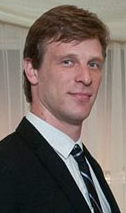-
Uddannelse
Find uddannelse
Studievejledning
Besøg AU
Kvalitet
-
Forskning
Aktuel forskning
Talent
-
Samarbejde
Gymnasier
Myndigheder
Alumner
- Om AU
Nicholas Furl, Department of Psychology, Royal Holloway, University of London is visiting Aarhus and will give a guest talk entitled: "Social information from others’ faces: Computations spanning vision to decisions"
26.10.2018 |
| Dato | man 04 feb |
| Tid | 13:30 — 14:30 |
| Sted | CFIN and MIB meeting room, 5th floor, AUH building 10G, Nørrebrogade 44, Aarhus C |

Nicholas Furl
Department of Psychology
Royal Holloway
University of London
Title: Social information from others’ faces: Computations spanning vision to decisions
Abstract:
To navigate our social world, we rely on social information in others’ faces. To interact with people, our perceptual systems must recognise visual information, such as emotional expressions. But we also must make complex decisions based on visual information in faces. For example, faces are also reproductive fitness signals in humans. Humans use facial attractiveness to make decisions about whether to approach or avoid potential mates. This talk will describe two arms of research that respectively deal with these two levels of social interaction – vision and decision. Both come with distinct computational problems that the human neural circuitry somehow overcomes.
At the visual level, popular theories of face coding assert that neurons represent faces in a “similarity space” centred on an expected value or “norm” face. Although this viewpoint is supported by studies using static face photographs, perception of dynamic social information – such as facial expression movements - is a more challenging computational problem. I will describe new work using animated caricatures, functional magnetic resonance imaging and representational similarity analysis, which shows evidence for a neural similarity space for facial expression movements.
At the decision level, humans often make sequential decisions about the attractiveness of faces (e.g., swiping left and right on Tinder). We modelled decisions like these within the computational optimal stopping framework developed in economics and behavioural ecology. In our “fiancée problem” task, participants choose the most attractive face possible out of a sequence only when it is presented and not otherwise.
These searches were biased in a way that conflicts starkly with previous economics research on searches for good prices. This evidence suggests a surprising degree of domain-selectivity for decision biases.
ALL ARE WELCOME
Read more at about Nicholas Furl ...